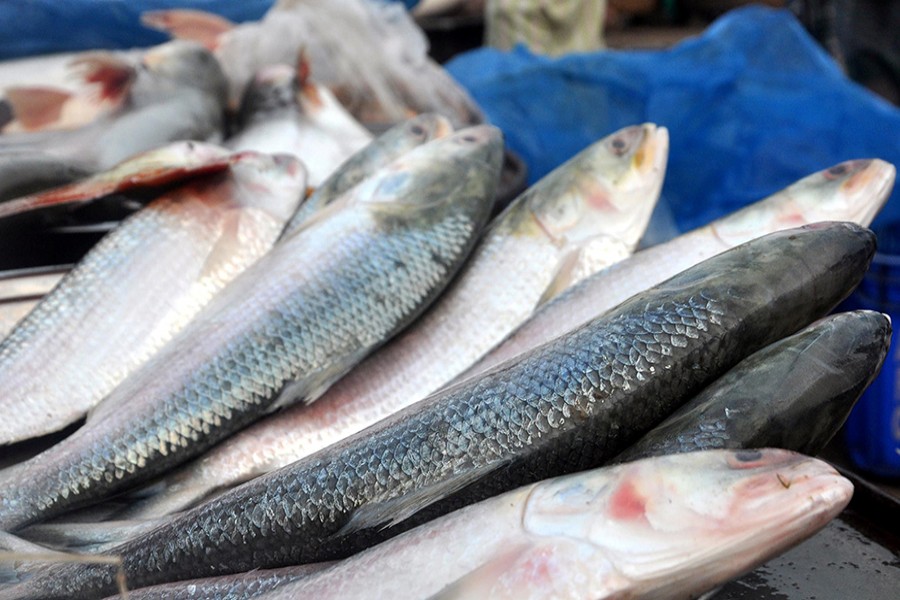
Published :
Updated :

Consumers across the country are feeling the pinch as prices of all fruits and riverine fish have surged sharply in the run-up to Pahela Baishakh, the first day of Bengali New Year, which falls on Monday.
Both imported and local fruits have seen record price surge, driven by increased demand ahead of the festive season.
Despite recent government measures, including a reduction in customs duties and taxes on imported fruits, retail prices remain high, offering little relief to shoppers.
In Dhaka's fruit markets, apples are still selling at Tk 300-470 per kg, oranges at Tk 320-370 per kg, grapes at Tk 500-850 per kg, and pomegranates at Tk 500-650 per kg, according to city fruit outlets.
Despite the tax exemption, importers and wholesalers have raised prices by an additional 10-15 per cent in just one week, said Motaher Hossain, a fruit shop owner at Zakir Hossain Road in Mohammadpur.
On March 16, the National Board of Revenue (NBR) reduced the regulatory duty on fresh fruit imports, including oranges and apples, by 5.0 per cent, lowering it from 30 per cent.
The advance tax (AT), previously set at 5.0 per cent, was also waived.
The exemption from the additional 25 per cent duty also applies to citrus, grapes, and pears. Earlier, on March 10, the NBR also reduced the advance income tax (AIT) by 5.0 per cent.
Meanwhile, taking advantage of lower supply, traders have also raised the price of watermelon ahead of the Bangla New Year celebration, claimed consumers.
On Friday, a visit to Karwan Bazar wholesale market revealed that wholesale prices ranged between Tk 10,000 to Tk 40,000 per 100 pieces, depending on size. Retail prices stood at Tk 40-55 a kg.
Some watermelons are also sold per piece, with medium-sized ones priced at Tk 300-500 and smaller ones at Tk 120-250.
Ahad Ali, a vendor at Karwan Bazar, said, "The supply of watermelon is decreasing, so prices are rising. Prices will go up further in a week."
Jobayer Islam, a watermelon wholesaler, said, "Most watermelons from Patuakhali are already sold out. Now, supply comes from Khulna, but prices have risen since Eid. Due to the heat, watermelons also spoil quickly. "
Humayun Kabir Bhuiyan, secretary of the Consumers Association of Bangladesh (CAB), said fruit demand has surged significantly due to rising temperatures.
He said that since the government has substantially reduced import duties, importers should now be strictly monitored to ensure prices of imported fruits stabilise at a reasonable level.
He also emphasised that traders of local fruits, such as watermelon, should also be scrutinised to prevent unethical profiteering.
Meanwhile, prices of indigenous fish such as ruhi, katla, hilsa, tengra, aair, boal, shrimp, shoul, puti, batashi, kajoli, and all kinds of dried fish have increased by Tk 100-250 per kg in the last week and a half.
Although the government has imposed a ban on hilsa fishing, marketing, and trading under its hilsa conservation programme, some super shops and markets still sell hilsa at Tk 2,000-3,500 per kg.
Current retail prices include ruhi at Tk 650-1,500 a kg, katla at Tk 550-1,250 a kg, shol at Tk 800-1,000 a kg, shrimp at Tk 900-1,650, river tengra at Tk 750-900, dried 'laitta' fish at Tk 1,200-1,500 a kg, dried 'bashpata' fish at Tk900-1150 a kg and dried 'chepa' at Tk 1,000-2,200 a kg, depending on quality.
Md Jalil, a fish vendor at Karwan Bazar, said: "Demand for fish has tripled during Pahela Baishakh, but fishing in major sanctuaries is banned under the hilsa conservation programme, leading to skyrocketing prices, especially for river fish."
Abdullah Riad, a grocer in West Dhanmondi, said wholesale prices of dried fish have increased by Tk 150-200 per kg, with retail prices rising by Tk 200-250 per kg.
He said that demand for both fresh and dried fish usually surges during Baishakh, which is the main reason for the price hike.
tonmoy.wardad@gmail.com


 For all latest news, follow The Financial Express Google News channel.
For all latest news, follow The Financial Express Google News channel.